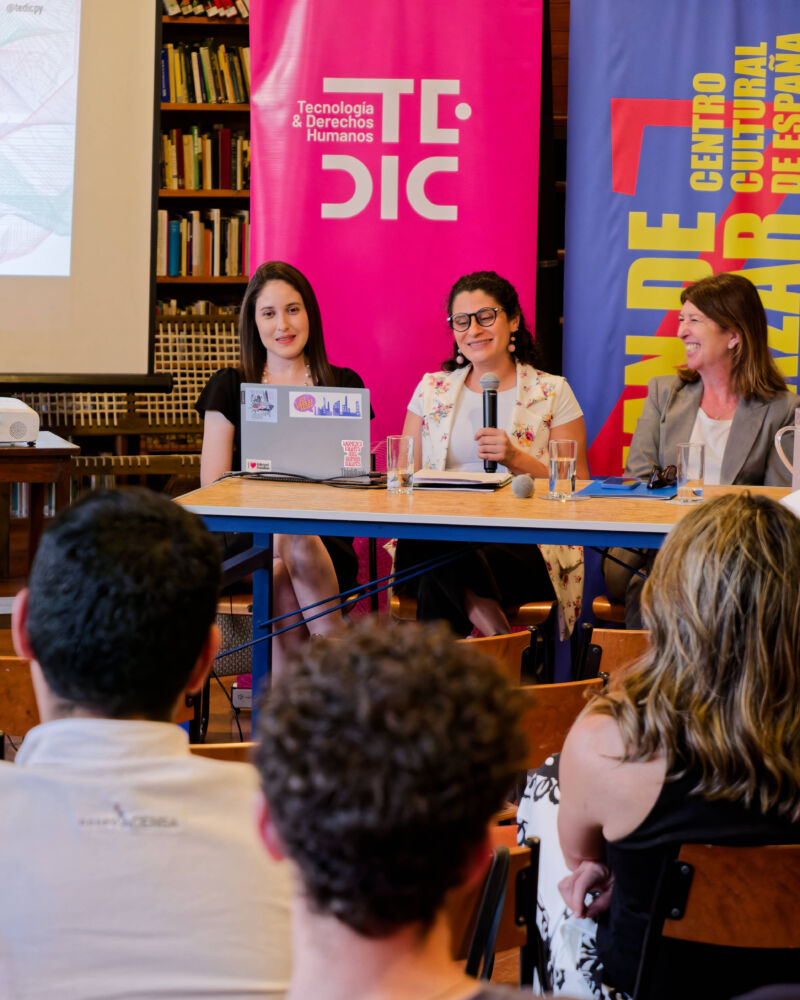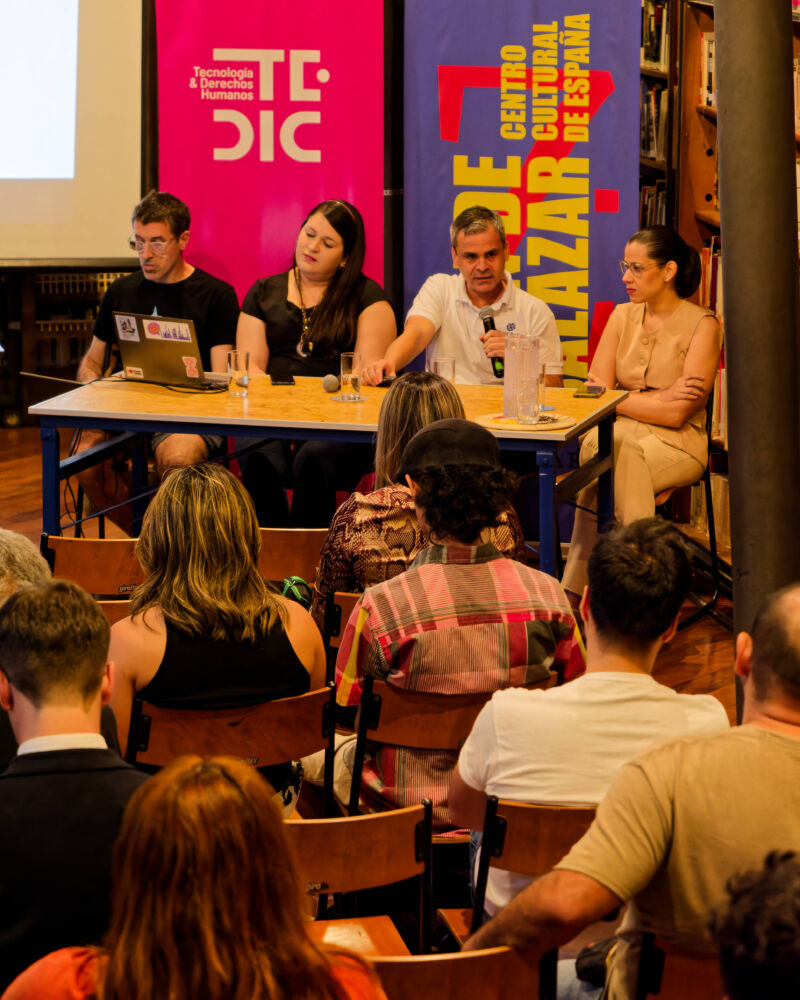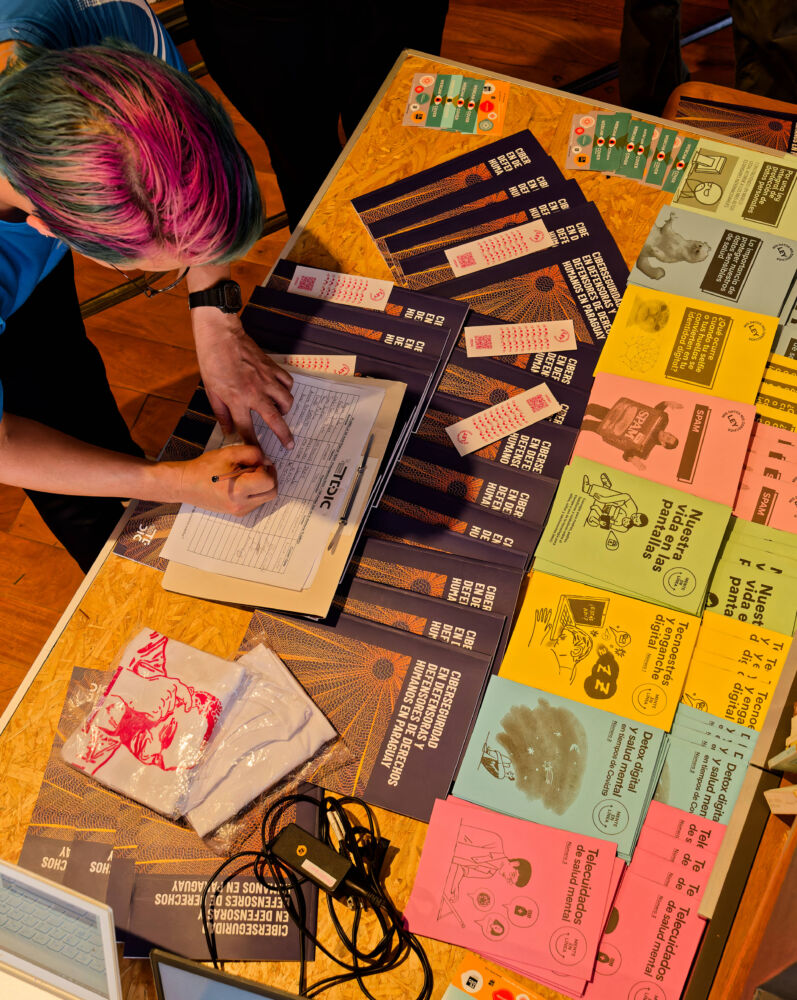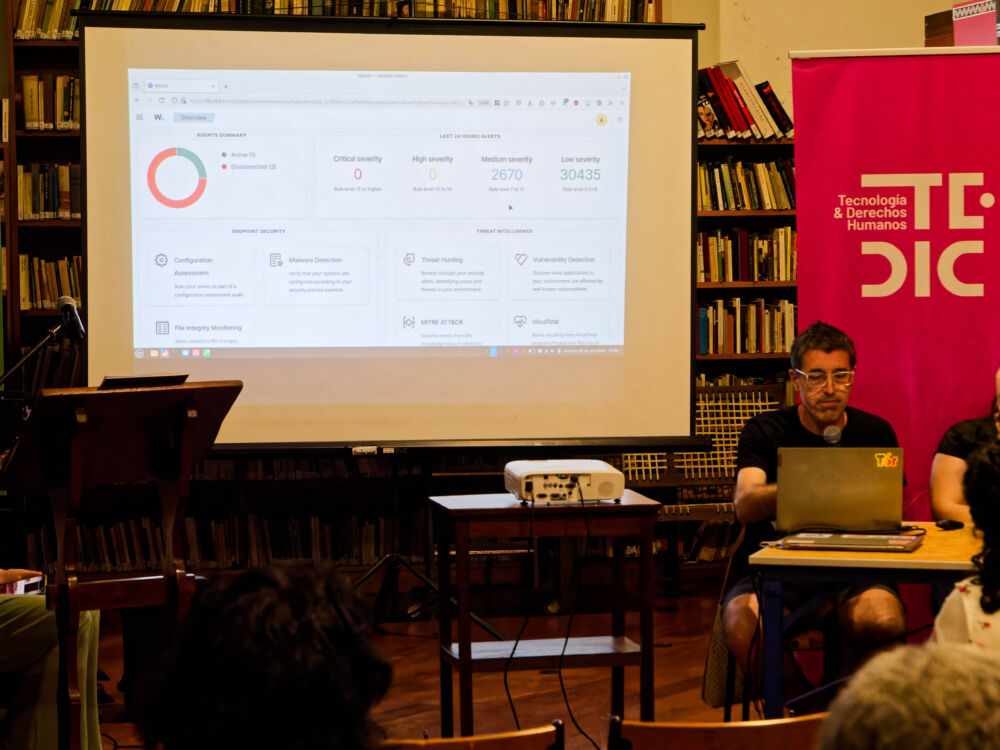
In a world where technology permeates every aspect of our lives, cybersecurity has become more than a protective measure; it’s a form of autonomy. From simple daily actions like safeguarding our passwords to defending digital activism against sophisticated attacks, the digital environment poses increasingly complex challenges.
With this in mind, at TEDIC we created a space to tackle these issues from an accessible and collective perspective: Cybersecurity Week. Over three days, from October 29 to 31, the Centro Cultural de España Juan de Salazar became a gathering place for people from diverse backgrounds: activists, journalists, students, academics, and representatives from public institutions. Each brought their unique perspectives and questions, enriching an open dialogue about privacy and digital protection.
But this event wasn’t just about threats and risks. It focused on empowerment. The discussions revolved around understanding the technologies we use daily, becoming more conscious users, and claiming our digital rights. Cybersecurity, more than a shield, was presented as a tool for building safer and fairer digital spaces.
In a collaborative and educational environment, each panel and workshop invited participants to imagine a future where technology serves people, not the other way around. Because cybersecurity isn’t just an act of defense; it’s an act of autonomy and collective resistance. Below, we invite you to explore the highlights of each day.
Tuesday, October 29 – Toward a Collective Cybersecurity Strategy
Cybersecurity Week kicked off on Tuesday, October 29, with the launch of a groundbreaking study on cybersecurity for human rights defenders in Paraguay. The event featured prominent speakers such as Paula Berruti, Human Rights Officer at the United Nations Regional Office for Latin America, Dante Leguizamón from the Coordinadora de Derechos Humanos en Paraguay, and Mariela Cuevas from TEDIC. They shared key findings on the digital risks faced by human rights defenders today.
We also hosted a panel on current cybersecurity issues in Paraguay and a live demonstration of blue team tools, featuring speakers from the government, private sector, and civil society organizations working in technology and human rights.
Highlighted presentations included:
- Update on the National Cybersecurity Strategy 2024-2028 by Diana Valdez from the General Directorate of Cybersecurity CERT-PY – MITIC.
- Privacy, Encryption, and Filtering on the Internet by Raul Querey from Internet Society Paraguay Chapter.
- Cybersecurity Concepts and Advice by Paola Brizuela from BTC Consulting.
- Cybersecurity in Activism and Blue Team Tools Demonstration (Wazuh and PiRogue) by Lupa from TEDIC.




The discussions emphasized best practices in cybersecurity and the urgent need to strengthen regulations and policies around digital privacy. Attendees learned essential techniques to protect their devices, personal data, and networks while exploring the latest tools and software to enhance online security.
Wednesday, October 30 – Mental Health and Its Connection to Technology
The second day delved into a less explored but equally critical topic: the link between cybersecurity and mental health. Activists working in high-risk contexts face not only cyberattacks but also the psychological impact they bring.
Maricarmen Sequera kicked off the workshop by sharing resources from the Mente en Línea campaign, exploring how techno-stress affects our behavior and well-being. Following this, Raquel Samudio provided a psychiatric perspective, and Montserrat Vera from Psicofem offered practical tools from psychology to mitigate the negative effects of technology.
This day was not just about learning; it was about collective care. Participants reflected on how digital security is not merely a technical act but a strategy of self-care and resilience in the face of constant digital pressure.
Thursday, October 31 – Cybersecurity as an Ally for Journalism
The week concluded on Thursday afternoon with a presentation of gender-intersectional guidelines for digital security and a hands-on cybersecurity workshop tailored for journalists.
Mariela Cuevas from TEDIC and Santiago Ortiz from the Sindicato de Periodistas del Paraguay highlighted the critical role of digital security in journalism.
The presented guidelines included:
- Digital Protection Against Organized Crime by Maricarmen Sequera from TEDIC.
- Monitoring and Documenting Attacks on Journalists by Ruth Benítez from the Sindicato de Periodistas del Paraguay.
- How to Highlight Cases of Violence: Using Landmark Cases for Advocacy by Lourdes Cano and Montserrat Berro from the Sindicato de Periodistas del Paraguay.
- Litigating Cases of Violence Against Journalists with a Gender Perspective by Alejandro Vera.
Finally, Lupa from TEDIC led a practical cybersecurity workshop, equipping journalists with essential techniques to protect their devices, personal data, and networks, while introducing them to key tools and software to reinforce online security.
What’s Next? Cybersecurity as a Collective Commitment
Over three days, people from diverse sectors shared knowledge, reflected collectively, and paved the way for a safer and more equitable digital environment.
Cybersecurity is not only about shielding ourselves from threats; it’s a means to empower ourselves, take control of our tools, and defend our rights in the digital realm. At TEDIC, we believe this responsibility is collective, and we’re grateful to everyone who joined us in this mission.
We will continue working together to build a digital future where privacy, security, and autonomy are rights for all.
From TEDIC, we extend our deepest thanks to all the participants, volunteers, speakers, and team members who made Cybersecurity Week possible.

